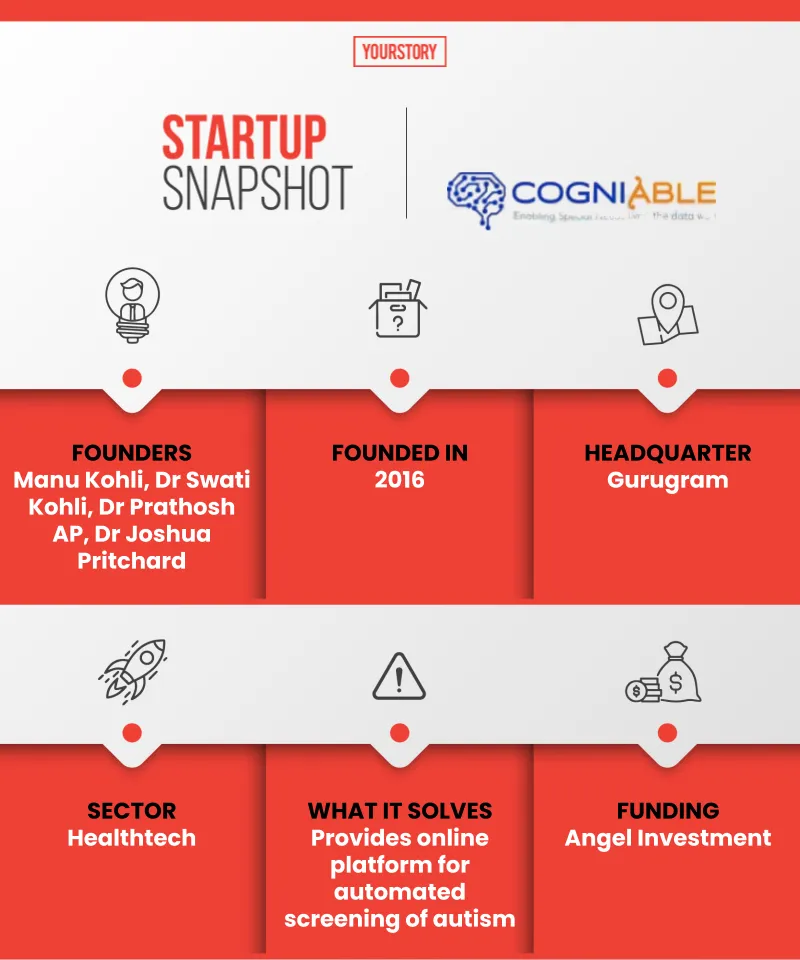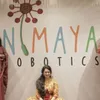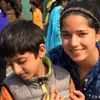[Tech30] How Gurugram-based CogniAble is using ML for early detection of autism spectrum disorder
A YourStory Tech30 startup for 2020, Gurugram-based CogniAble provides two solutions: early automated screening for autism and digital therapy management.
Autism spectrum disorder isn’t easy to understand, but depictions in TV and movies have helped familiarise us with the developmental disorder that affects communication and behaviour.
Till now, lack of awareness and medical information often led several people to suffer quietly from illnesses such as depression, bi-polar disorder, autism spectrum disorder, Asperger’s syndrome, and others.
Things are changing now.
With the spotlight trained on mental health, several entrepreneurs, innovators, and startups are doing their bit to ensure proper treatment and a better quality of life for people suffering from such disorders.
Gurugram-based CogniAble is using machine learning-based assistive technology to ensure early detection and affordable treatment of autism spectrum disorder.
Founded in 2016 by Manu Kohli with his wife Dr Swati Kohli, Dr Prathosh AP and Dr Joshua Pritchard, the startup aims to bring affordability, accessibility and high-quality management to homes across India.
Autism can be diagnosed at any age, but it is said to be a “developmental disorder” as symptoms generally appear in the first two years of life. This is why CogniAble is focusing on early detection by providing an online platform where people can upload videos of children and get them screened for autism.

Illustration: YS Design
The early journey
Speaking to YourStory, Co-founder and CEO Manu Kohli says he was always interested in technological solutions.
“Married to a child psychologist and a special educator, I have seen the growing demand of special needs services in India. However, the major transformation came after our son was diagnosed with autism. While exploring services in India, the US, and Europe, and by experiencing autism services as a parent, we saw an opportunity and understood the need of technology to manage both: autism screening and intervention,” Manu says.
The co-founder says he and his wife had four main objectives: affordable service, ability to be used by non-experts, a remote solution, and a data-driven platform.
Manu, an engineer and management graduate has 16 years of experience, and is working on his PhD at IIT-Delhi, focusing on developing affordable and scalable solutions for neuro-developmental disorders. Dr Swati has 18 years of experience in working with children with neuro-developmental delays.
They were joined by their friends, IIT-Delhi faculty member Dr Prathosh, an expert in computer vision who holds a PhD degree from IISc Bangalore, and Dr Joshua, who holds a PhD in behaviour analysis from the University of Nevada and runs his own autism clinics in the US.
Using technology to solve problems
Quoting data from Indian Academy of Pediatrics, Manu says all children should be screened using standardised autism screening tools between 18 and 24 months of age. However, limited health professionals and infrastructure mean several children are diagnosed a year or two late.
“CogniAble is an online platform available remotely for early screening and affordable behavioural intervention for autism spectrum disorders,” he says.
It provides two solutions: early automated screening for autism and digital therapy management.
The co-founder explains that users can upload videos of children using the mobile application. These are analysed by deep learning models to identify fine motor, gross motor, and complex actions based on a stimulus provided by a caregiver.
The proprietary algorithms conduct an analysis and give an autism screening prediction by providing a risk score. The prediction is made on the basis of 12 behavioural landmarks suggested by doctors.
“We have developed innovative transfer learning techniques using computer vision; two patents have been filed. The innovation allows us to develop machine learning models with 25 percent of the video data.”
After detection of autism, behavioural therapies are key to develop necessary skills promoting school and societal inclusion of children. The platform enables parents, schools, and institutes to get access to integrated assessment and treatment plans at 20 percent of the traditional costs, the founder claims.
“Even in metro cities, behavioural treatment services cost more than Rs 3 lakh a year, an amount that is unaffordable for the majority. India has more than 15 million individuals with autism, and we are adding 200,000 new cases every year,” the CEO explains.
CogniAble is available on both Android and IoS. It offers personalized intervention plan in 21 domains such as language, behaviour, academics, classroom, and social skills. These are available in the form of lesson plans and video modelling with data recording and feedback provisions.
“Our machine learning models build customised treatment for the child, measuring longitudinal treatment progress with structured and unstructured data. This brings significant change in the self-dependency and skills of children at a young age,” he says.
Apart from the co-founders, CogniAble has a 12-member team, including seven psychologists, four technical experts, and a business development and marketing manager. Twelve subcontractors work with the startup in the areas of psychology and mobile & app development.

CogniAble's online platform, which is available remotely, helps in early screening and affordable behavioural intervention for children with autism spectrum disorders. [Image Credit: CogniAble]
Business and more
The co-founders launched the company with an initial investment of Rs 50 lakh. Manu says the company has raised seed funding and also received grants and awards.
“We are looking for funds to enhance technology features, make machine learning models mature, and scale and enter markets in India, the US, and other countries,” he says.
The co-founder also added that the company works with Dr. Monica Juneja, professor at Maulana Azad Medical College and Dr. Manushree Garg from Vardhman Mahavir Medical College Delhi for further development and clinical trials of the products.
The founder explains that the startup operates on three business models - it works with governments through primary and secondary healthcare centres and public hospitals, B2B with special need clinics, schools, private hospitals, and the B2C model, where it works directly with parents.
“For B2G and B2B segments, our solution is available as a mobile app for a monthly subscription cost ranging between Rs 600-800 per month per learner. For B2C customers, our price is around Rs 3,500 as it includes four personalised sessions with experts for assessment , programme creation, revision, and explanation,” Manu says.
Six clinics from India, the US, and Bangladesh are at present using the application with more than 100 users. The startup has also joined hands with Fortis Mental Health to scale up its presence in the Asia-Pacific region.
Like CogniAble, Chennai-based Nimaya Robotics is also involved in helping autistic children learn to perform basic functions and lead an independent life. It uses robotics-based therapy.
CogniAble plans to develop its mobile application to support multiple languages and ensure maximum reach. It is also looking to integrate acceptance and commitment therapy into the application for parents or therapists working with special needs children.
“In the long term, we plan to offer diagnostic and prescriptive solutions for behavioural health disorders such as ADHD, dementia, Alzheimer’s, and learning disability.
“Our biggest goal is to work with the government and convince them to integrate CogniAble screening services with normal vaccination schedules in the age group of 2-5 years. We also want to reach community workers in India, train them, and take our services to Tier II and III towns and villages,” Manu says.
Edited by Teja Lele


![[Tech30] How Gurugram-based CogniAble is using ML for early detection of autism spectrum disorder](https://images.yourstory.com/cs/2/b094ec506da611eab285b7ee8106293d/collage-1-1602139134167.png?mode=crop&crop=faces&ar=2%3A1&format=auto&w=1920&q=75)


